(完整版)东西方邀请语文化差异
(完整版)东西方邀请语文化差异
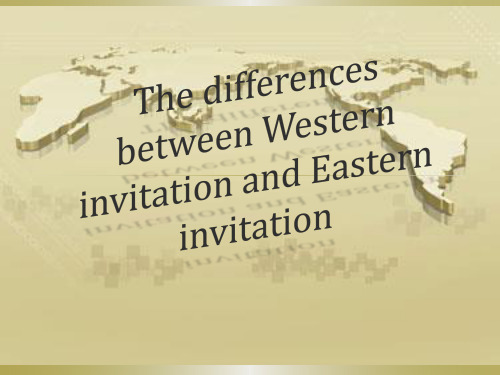
6. Do you want ...?你想……吗?如:
Do you want to come with us? 你想和我们一起来吗?
[接受邀请的表白]
1. Yes / Certainly / Sure. I'd like / love to. 是的,我很愿
意去。(注:答语后面的“to”不可省略)
你的电话吗?
2.非正式的请求用:Could / Can I ..., please? 意为“请
问,我能……吗?”在这种句式中,用could比用can
语气委婉,显得有礼貌,而用can则指家人、朋友等不拘 礼节的较为随便的场合。如:
Байду номын сангаас
Could I open the windows, please? 请问,我能打开窗
5. I'd love to come. Thank you for inviting / asking me. 我
很高兴来,感谢你邀请我。
[不能赴约的婉言谢绝] 1. That's very kind of you, but I'm afraid... 你真
是太好了,不过恐怕……。 2. I'd love / like to, but I have to... 我很想来,
中国人邀请客人会准备一大桌子的菜, 并在就餐过程中使劲劝说客人多吃点, 吃完之后, 还有剩菜,就表明主人的盛情 款待.
China invited guests will prepare a table of food and dining and hard to persuade the guests to eat more, and after eating, there are leftovers, it means that the owner's hospitality
邀请函的文化差异需要注意什么
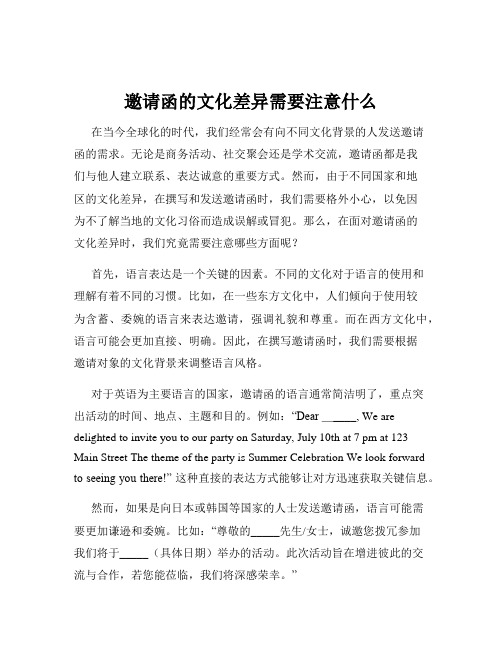
邀请函的文化差异需要注意什么在当今全球化的时代,我们经常会有向不同文化背景的人发送邀请函的需求。
无论是商务活动、社交聚会还是学术交流,邀请函都是我们与他人建立联系、表达诚意的重要方式。
然而,由于不同国家和地区的文化差异,在撰写和发送邀请函时,我们需要格外小心,以免因为不了解当地的文化习俗而造成误解或冒犯。
那么,在面对邀请函的文化差异时,我们究竟需要注意哪些方面呢?首先,语言表达是一个关键的因素。
不同的文化对于语言的使用和理解有着不同的习惯。
比如,在一些东方文化中,人们倾向于使用较为含蓄、委婉的语言来表达邀请,强调礼貌和尊重。
而在西方文化中,语言可能会更加直接、明确。
因此,在撰写邀请函时,我们需要根据邀请对象的文化背景来调整语言风格。
对于英语为主要语言的国家,邀请函的语言通常简洁明了,重点突出活动的时间、地点、主题和目的。
例如:“Dear _____, We are delighted to invite you to our party on Saturday, July 10th at 7 pm at 123 Main Street The theme of the party is Summer Celebration We look forward to seeing you there!” 这种直接的表达方式能够让对方迅速获取关键信息。
然而,如果是向日本或韩国等国家的人士发送邀请函,语言可能需要更加谦逊和委婉。
比如:“尊敬的_____先生/女士,诚邀您拨冗参加我们将于_____(具体日期)举办的活动。
此次活动旨在增进彼此的交流与合作,若您能莅临,我们将深感荣幸。
”其次,礼仪规范在不同文化中也存在差异。
在一些文化中,邀请函的发送方式和时间有着严格的规定。
比如,在正式的商务邀请中,德国人通常会提前较长时间发送邀请函,以显示对对方的尊重和重视。
而在一些拉丁美洲国家,邀请的时间可能会相对较晚。
另外,邀请函的格式和内容也会因文化而异。
东西方邀请语文化差异共18页
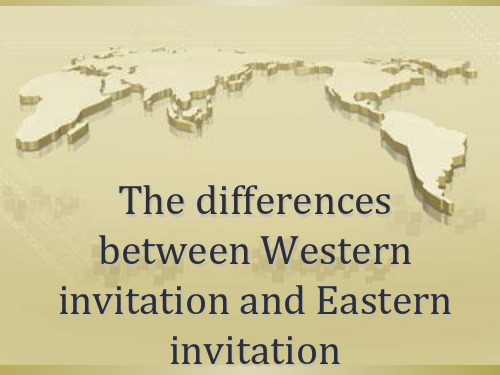
invitation
中国人邀请客人会准备一大桌子的菜, 并在就餐过程中使劲劝说客人多吃点, 吃完之后, 还有剩菜,就表明主人的盛 情款待.
China invited guests will prepare a table of food and dining and hard to persuade the guests to eat more, and after eating, there are leftovers, it means that the owner's hospitality
你愿意和我一起去动物园吗?
2. I hope you can...我希望你能……。如: I hope you can go to the cinema with us.
3. I'd / We'd like like to invite you to go shopping with us. 我们想邀请你和我们一起去买东西。
西方人一不劝吃,二就餐完毕后,盘子最 好是空的
Westerners one is not advised to eat two meals after the dish is best to empty.
在中国,为了表示热情好客,人们往往会 请人在自己家里吃饭,要是在外就餐时, 主人也会抢着为客人买单
如果接到酒会(cocktail party)或者茶会 (tea party)等社交活动的请柬,人们一 般能在请柬上找到具体的时间安排,如 “下午5时至7时”。这样的情况下,受邀 人可以在5至7时之间的任何时刻赶赴酒会 或茶会,当然不要在酒会临近结束时才匆 匆赶去。至于离开时间,客人没必要7时准 时告辞,稍许呆得长一些一般无伤大雅。 在过到了7时30分,客人应该考虑起身回家 了。
中外文化邀请的差异英语作文
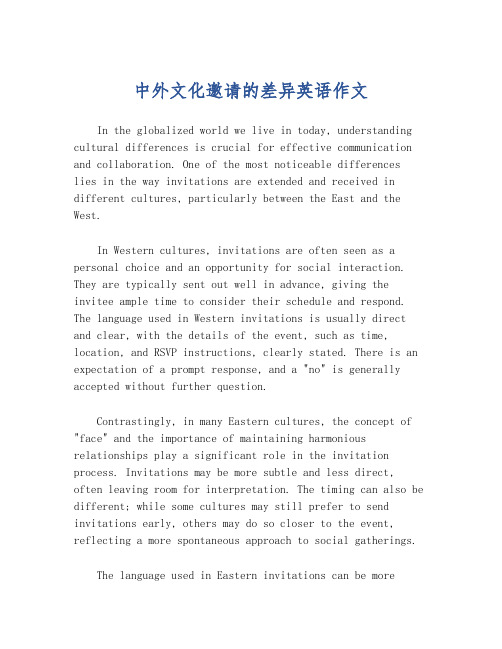
中外文化邀请的差异英语作文In the globalized world we live in today, understanding cultural differences is crucial for effective communication and collaboration. One of the most noticeable differenceslies in the way invitations are extended and received in different cultures, particularly between the East and the West.In Western cultures, invitations are often seen as a personal choice and an opportunity for social interaction. They are typically sent out well in advance, giving the invitee ample time to consider their schedule and respond. The language used in Western invitations is usually direct and clear, with the details of the event, such as time, location, and RSVP instructions, clearly stated. There is an expectation of a prompt response, and a "no" is generally accepted without further question.Contrastingly, in many Eastern cultures, the concept of "face" and the importance of maintaining harmonious relationships play a significant role in the invitation process. Invitations may be more subtle and less direct, often leaving room for interpretation. The timing can also be different; while some cultures may still prefer to send invitations early, others may do so closer to the event, reflecting a more spontaneous approach to social gatherings.The language used in Eastern invitations can be morenuanced, with an emphasis on politeness and respect. It is not uncommon for an invitation to be phrased in a way that does not directly ask for a response, but rather implies an expectation of attendance. In such cases, a failure to respond or attend might be seen as a slight or a sign of disrespect.Furthermore, the concept of reciprocity is deeply ingrained in many Eastern cultures. An invitation is not just an offer to attend an event; it is also an opportunity to strengthen bonds and relationships. As such, the act of accepting or declining an invitation carries a weight of social responsibility.In conclusion, the differences in invitation practices between Eastern and Western cultures highlight the importance of cultural awareness. Being sensitive to these nuances can lead to more successful interactions and foster better understanding between people from diverse backgrounds. Whether it is the directness of a Western invitation or the subtlety of an Eastern one, recognizing and respecting these differences can pave the way for more meaningful and enjoyable social engagements.。
浅谈东西方语用文化的差异

浅谈东西方语用文化的差异随着世界的全球化,东西方国家之间的交流变得越来越频繁。
然而,尽管在语言上我们都使用的是英语,但是东西方语用文化之间的差异仍然是一个巨大的挑战。
在本文中,我们将探讨一下这些文化之间的差异并尝试解释它们的原因。
首先,东西方语用文化的差异主要体现在倾听和沟通方式方面。
让我们首先看看东方语用文化。
在东方文化中,倾听和沟通的方式更加倾向于间接和含蓄的方式。
与此相反,在西方文化中,沟通则更加直接和明确。
例如,在一个典型的西方公司里,员工们倾向于通过邮件和电话来沟通。
而在东方国家,像中国和日本这样的文化中,人们倾向于使用面对面或电话沟通的方式。
此外,在东方国家中,人们倾向于使用更多的礼貌用语和敬语来表示尊重和恭敬。
这样做可以赢得别人的好感,但如果不了解这些规矩,很可能引起误解。
其次,在表达自己的意见方面,东西方国家也存在着明显的差异。
在西方国家里,人们更愿意陈述他们自己的立场和观点。
在另一方面,东方文化中的人们倾向于表现得更加谦虚,通常不会直接陈述自己的意见,而是通过还有间接的方式来表达。
例如,在中国文化中,人们不会直接说“不”,而是会用比较含混的方式来表达他们的立场。
此外,在这些文化中,人们可能会使用一些琐碎的细节来说明自己的观点。
这是因为他们更关注的是彼此间的互动,而非单纯的表达自己的观点。
最后,语言的直接性也是一个重要的问题。
在东方语言中,人们更喜欢使用隐喻和比喻来表达自己的意思。
这些隐喻和比喻通常是由某些特殊的文化、历史及传统的背景支持的。
而在西方语言中,人们倾向于使用更加直接、干净利落的语言,这样会让他们在交流过程中更加明确和直接。
那么这些东西方语用文化之间的差异究竟起源于何处?主要的原因是东方文化和西方文化对人际关系的看法以及沟通方式的不同。
在东方文化中,人们更加注重彼此间的关系,而不是单纯的表达自己的意见。
相比之下,西方文化中的人们则更加注重自己的利益和意见。
此外,这种文化差异也可能归因于不同文化形成背景的差异。
中西宴请礼仪差异_商务礼仪_
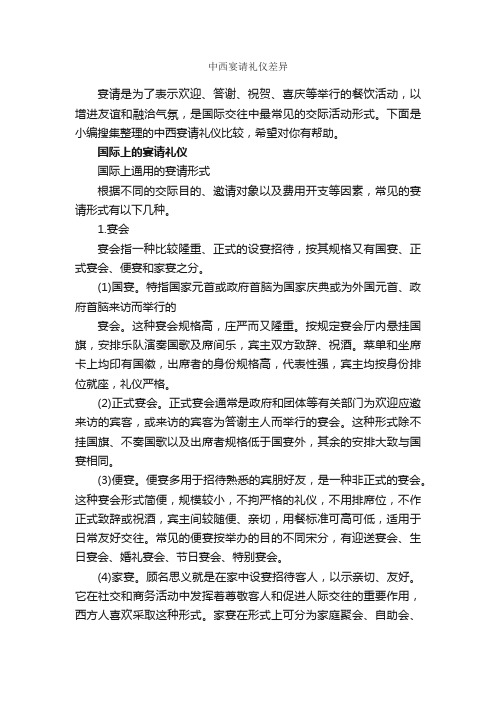
中西宴请礼仪差异宴请是为了表示欢迎、答谢、祝贺、喜庆等举行的餐饮活动,以增进友谊和融洽气氛,是国际交往中最常见的交际活动形式。
下面是小编搜集整理的中西宴请礼仪比较,希望对你有帮助。
国际上的宴请礼仪国际上通用的宴请形式根据不同的交际目的、邀请对象以及费用开支等因素,常见的宴请形式有以下几种。
1.宴会宴会指一种比较隆重、正式的设宴招待,按其规格又有国宴、正式宴会、便宴和家宴之分。
(1)国宴。
特指国家元首或政府首脑为国家庆典或为外国元首、政府首脑来访而举行的宴会。
这种宴会规格高,庄严而又隆重。
按规定宴会厅内悬挂国旗,安排乐队演奏国歌及席间乐,宾主双方致辞、祝酒。
菜单和坐席卡上均印有国徽,出席者的身份规格高,代表性强,宾主均按身份排位就座,礼仪严格。
(2)正式宴会。
正式宴会通常是政府和团体等有关部门为欢迎应邀来访的宾客,或来访的宾客为答谢主人而举行的宴会。
这种形式除不挂国旗、不奏国歌以及出席者规格低于国宴外,其余的安排大致与国宴相同。
(3)便宴。
便宴多用于招待熟悉的宾朋好友,是一种非正式的宴会。
这种宴会形式简便,规模较小,不拘严格的礼仪,不用排席位,不作正式致辞或祝酒,宾主间较随便、亲切,用餐标准可高可低,适用于日常友好交往。
常见的便宴按举办的目的不同宋分,有迎送宴会、生日宴会、婚礼宴会、节日宴会、特别宴会。
(4)家宴。
顾名思义就是在家中设宴招待客人,以示亲切、友好。
它在社交和商务活动中发挥着尊敬客人和促进人际交往的重要作用,西方人喜欢采取这种形式。
家宴在形式上可分为家庭聚会、自助会、家庭冷餐会和在饭店宴请等几种。
2.招待会招待会是一种灵活、经济实惠的宴请形式。
常见的招待会主要分为冷餐会、自助餐和酒会三种。
(1)冷餐会。
冷餐会的特点是一种立餐形式,不排座位。
菜肴以冷食为主,也可冷热兼备,连同餐具一同摆设在餐桌上,供客人自取。
客人可以多次取食,站立进餐自由活动,彼此交谈。
当然,对于老年、体弱者要准备座椅,可由服务员接待。
东西方语言差异与文化差异
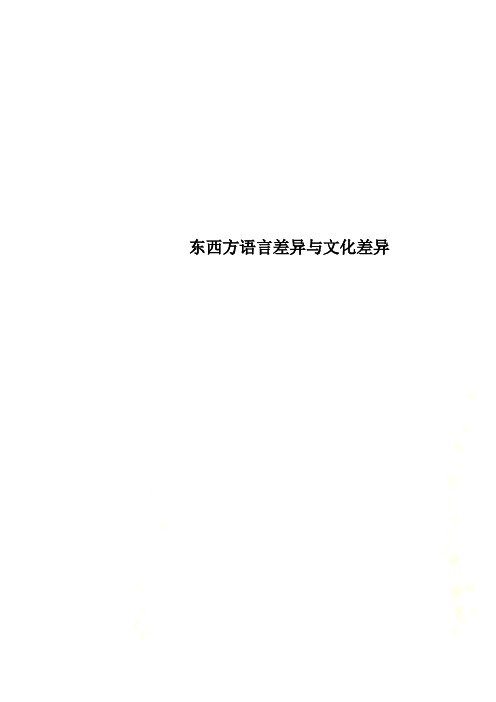
东西方语言差异与文化差异东西方语言差异与文化差异1.在一种语言里有些词在另一语言里没有对应词。
汉语中有个谚语;“夏练三伏,冬练三九”。
激励人们坚持锻炼身体。
“三伏”和“三九”在英语里是什么呢?一个年轻翻泽对几个加拿大人说three fu和three nine。
听的人当然莫名其妙。
他只要说In summer keep exercisi ng during the hottest days;In winter do the same thing during the coldest weather就可以了。
一个中国青年到附近游泳池去游泳,一会儿就回来了。
和他同住一室的中国人和一个外国朋友都感到奇怪。
他解释说:“游泳池里人太多,水太脏,早该换了。
简直象芝麻酱煮饺子。
”这个比喻很别致,很生动,和他同住一室的中国朋友笑了,而那个外国人既没有吃过“芝麻酱”也没有见过“煮饺子”,丝毫不觉得这个比喻幽默,难怪他显出一副茫然不解的神情。
西方人形容某地人多、拥挤不堪,常说It was papked like sardines(塞得象沙丁鱼罐头一样,拥挤不堪)。
自己有lover呢?应该记住,相当于汉语中“爱人”这个词的英语词就是:husband(丈夫)或wife(妻子);frience(未婚夫)或fiancee (未婚妻)。
中国人问别人的“籍贯”时,可能指place of birth或where a person is from(本人的出生地或来自某地),也往往指where a per son’s parents or ancestors came from originally(父母或祖先来自何地)。
有时候两个地方是相同的,但也常常不同。
在英语中没有与“籍贯”对应的词。
Place of birth 只表示本人出生的地方,与祖先的任何情况无关。
这种差别有时会造成混乱,填写身份证、个人履历表、护照等时尤其如此。
下面再举一些英汉两种语言中“貌合神主”的词语的例子。
东西方语用文化的差异

浅谈东西方语用文化的差异摘要:东西方在语用文化方面存在很多差异,使得东西方人在交际中形成了诸多障碍,甚至造成文化冲突。
该文试从地理环境和经济制度角度介绍了东西方文化差异形成的原因,并从称谓、打招呼、赞美等语用文化方面具体阐述了东西方文化差异的表现,希望能够给在跨文化交际中的人们提供一些启示和思考。
关键词:文化差异称谓打招呼赞美跨文化交际中图分类号:h3 文献标识码:a 文章编号:1674-098x(2013)03(c)-0-02人总是生活在一定的环境之中,处于这种环境的制约之下,对生活的某种感受,就在其思想、观念、生活方式等方面予以强调,而其他方面却被忽略,形成了自身的文化。
东西方人生活在不同的环境之中,受各自民族的历史、传统宗教、价值观念、社会组织、风俗习惯、社会所处的发展阶段和社会制度等的影响,从而形成了东西方人不同的文化。
所谓文化是指人类所独有的社会遗产,在人们的潜意识中,指导着人们的一切行动,文化既有传承性,又有变化性。
文化既包括信念、价值观念、习俗、知识等,也包括实物和器具,而价值观念是文化的核心。
1 东西方文化形成的原因—地理环境、社会经济的不同中国是个大陆国家,在中国古代人心目中,世界就是他们生活的这片土地。
所以中文“普天之下”“四海之内”就是中国人表述的“世界”。
与西方大多是海洋国家不同,他们早就知道国家之外的世界还有很多国家。
中国地大物博,物产丰富,而且古代中华民族历来依靠农业维持生存,商品是以农业生产为前提的。
这种以农为上的思想显示出时代的经济背景。
农民靠土地生活,土地无法移动,地主阶级的读书人也无法离开土地,除非做官。
所以中国的社会制度便是家族制度,传统中国把社会关系归纳为五种即君臣、父子、兄弟、夫妇、朋友,这五种关系中三种是家族关系,另两种也是家庭关系的延伸。
而生活在海洋国家的西方人,靠贸易维持繁荣,他们首先是商人。
商人就要与账目的抽象数字打交道。
然后,他们才和数字所代表的具体事物打交道。
日常交际用语中的中西文化差异
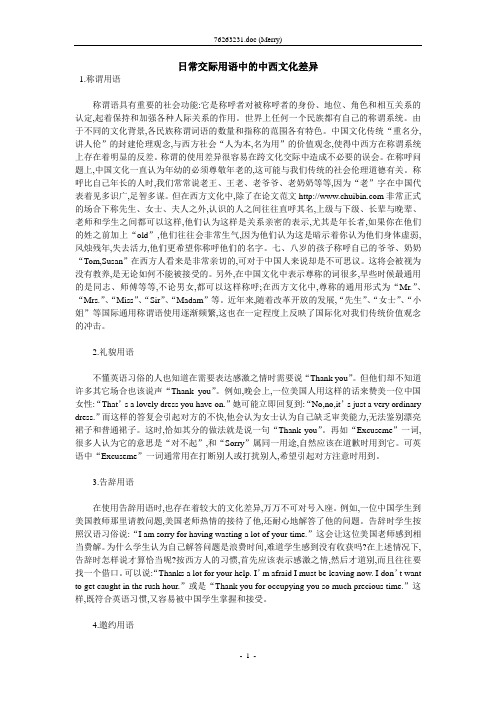
日常交际用语中的中西文化差异1.称谓用语称谓语具有重要的社会功能:它是称呼者对被称呼者的身份、地位、角色和相互关系的认定,起着保持和加强各种人际关系的作用。
世界上任何一个民族都有自己的称谓系统。
由于不同的文化背景,各民族称谓词语的数量和指称的范围各有特色。
中国文化传统“重名分,讲人伦”的封建伦理观念,与西方社会“人为本,名为用”的价值观念,使得中西方在称谓系统上存在着明显的反差。
称谓的使用差异很容易在跨文化交际中造成不必要的误会。
在称呼问题上,中国文化一直认为年幼的必须尊敬年老的,这可能与我们传统的社会伦理道德有关。
称呼比自己年长的人时,我们常常说老王、王老、老爷爷、老奶奶等等,因为“老”字在中国代表着见多识广,足智多谋。
但在西方文化中,除了在论文范文非常正式的场合下称先生、女士、夫人之外,认识的人之间往往直呼其名,上级与下级、长辈与晚辈、老师和学生之间都可以这样,他们认为这样是关系亲密的表示,尤其是年长者,如果你在他们的姓之前加上“old”,他们往往会非常生气,因为他们认为这是暗示着你认为他们身体虚弱,风烛残年,失去活力,他们更希望你称呼他们的名字。
七、八岁的孩子称呼自已的爷爷、奶奶“Tom,Susan”在西方人看来是非常亲切的,可对于中国人来说却是不可思议。
这将会被视为没有教养,是无论如何不能被接受的。
另外,在中国文化中表示尊称的词很多,早些时候最通用的是同志、师傅等等,不论男女,都可以这样称呼;在西方文化中,尊称的通用形式为“Mr.”、“Mrs.”、“Miss”、“Sir”、“Madam”等。
近年来,随着改革开放的发展,“先生”、“女士”、“小姐”等国际通用称谓语使用逐渐频繁,这也在一定程度上反映了国际化对我们传统价值观念的冲击。
2.礼貌用语不懂英语习俗的人也知道在需要表达感激之情时需要说“Thank you”。
但他们却不知道许多其它场合也该说声“Thank you”。
例如,晚会上,一位美国人用这样的话来赞美一位中国女性:“That’s a lovely dress you have on.”她可能立即回复到:“No,no,it’s just a very ordinary dress.”而这样的答复会引起对方的不快,他会认为女士认为自己缺乏审美能力,无法鉴别漂亮裙子和普通裙子。
浅谈东西方语用文化的差异

浅谈东西方语用文化的差异摘要:东西方在语用文化方面存在很多差异,使得东西方人在交际中形成了诸多障碍,甚至造成文化冲突。
该文试从地理环境和经济制度角度介绍了东西方文化差异形成的原因,并从称谓、打招呼、赞美等语用文化方面具体阐述了东西方文化差异的表现,希望能够给在跨文化交际中的人们提供一些启示和思考。
关键词:文化差异称谓打招呼赞美跨文化交际人总是生活在一定的环境之中,处于这种环境的制约之下,对生活的某种感受,就在其思想、观念、生活方式等方面予以强调,而其他方面却被忽略,形成了自身的文化。
东西方人生活在不同的环境之中,受各自民族的历史、传统宗教、价值观念、社会组织、风俗习惯、社会所处的发展阶段和社会制度等的影响,从而形成了东西方人不同的文化。
所谓文化是指人类所独有的社会遗产,在人们的潜意识中,指导着人们的一切行动,文化既有传承性,又有变化性。
文化既包括信念、价值观念、习俗、知识等,也包括实物和器具,而价值观念是文化的核心。
1 东西方文化形成的原因—地理环境、社会经济的不同中国是个大陆国家,在中国古代人心目中,世界就是他们生活的这片土地。
所以中文“普天之下”“四海之内”就是中国人表述的“世界”。
与西方大多是海洋国家不同,他们早就知道国家之外的世界还有很多国家。
中国地大物博,物产丰富,而且古代中华民族历来依靠农业维持生存,商品是以农业生产为前提的。
这种以农为上的思想显示出时代的经济背景。
农民靠土地生活,土地无法移动,地主阶级的读书人也无法离开土地,除非做官。
所以中国的社会制度便是家族制度,传统中国把社会关系归纳为五种即君臣、父子、兄弟、夫妇、朋友,这五种关系中三种是家族关系,另两种也是家庭关系的延伸。
而生活在海洋国家的西方人,靠贸易维持繁荣,他们首先是商人。
商人就要与账目的抽象数字打交道。
然后,他们才和数字所代表的具体事物打交道。
商人同时又是居住在城镇中的人。
他们的活动要求他们在城镇聚居,因此他们的社会组织不是根据家族的共同利益,而是更多地反映城镇的共同利益。
(完整版)东西方邀请语文化差异

如果接到酒会(cocktail party)或者茶会 (tea party)等社交活动的请柬,人们一般
能在请柬上找到具体的时间安排,如“下 午5时至7时”。这样的情况下,受邀人可 以在5至7时之间的任何时刻赶赴酒会或茶
会,当然不要在酒会临近结束时才匆匆赶 去。至于离开时间,客人没必要7时准时告
辞,稍许呆得长一些一般无伤大雅。在过 到了7时30分,客人应该考虑起身回家了。
Байду номын сангаас
高兴。
2. It's a real pleasure to have you with us tonight. 今晚能请到你们,真是太荣幸了。
二、请求许可与你相约
[请求许可]
1.正式的请求用:May I ..., please?语气十分委婉,意
为“请问,我可以……吗?”。如:
May I use your telephone, please? 请问,我可以用一下
5. I'd love to come. Thank you for inviting / asking me. 我
很高兴来,感谢你邀请我。
[不能赴约的婉言谢绝] 1. That's very kind of you, but I'm afraid... 你真
是太好了,不过恐怕……。 2. I'd love / like to, but I have to... 我很想来,
户吗?
Thank You!
你的电话吗?
2.非正式的请求用:Could / Can I ..., please? 意为“请
问,我能……吗?”在这种句式中,用could比用can
语气委婉,显得有礼貌,而用can则指家人、朋友等不拘 礼节的较为随便的场合。如:
中西方邀请礼仪

中西方邀请礼仪很多时候,我们都会邀请别人来参加我们的宴会,那么对于邀请我们要注意什么呢?下面是店铺为大家整理的中西方邀请礼仪,希望能够帮到大家哦!中西方邀请礼仪中方邀请礼仪一、宴客的学问餐桌是一个绝佳的沟通平台,因为有菜肴餐食作媒介,还有酒水的鼓舞助兴,人们藉此能够扩大交友圈子,缩短人与人之间的距离,消除彼此的误解和摩擦,尤其美食佳肴在口中散发出的美妙感觉,会使人们的情绪愉快、放松。
在这种愉悦的气氛下,很容易让陌生人变成知己,让不熟悉的人变得熟悉起来。
因此有人说,餐桌是人际关系的润滑剂和调节器,真是一点儿也不错。
不仅如此,餐桌还是一个人展现个人素质、品位与才华的最佳舞台,一个具有良好餐饮礼仪、懂得应对进退、表现大方得体的人,很容易在一餐饭后,就结交了许多朋友,架设起友谊的桥梁,营造出和谐友好的人际关系与社交氛围。
反之,如果一个人不讲究餐饮礼仪,又没有良好的言谈举止,表现出小家子气、不拘小节的行为,一餐饭虽然只是细节的不注意,但可能使聚餐吃饭的好事变坏事,甚至有可能造成让别人瞧不起、朋友丢失、上司不满、客户流失、应聘失败、职位不保等问题,花钱请客吃饭不但没达到预期效果,反而招致反效果,得不偿失。
聚餐的时候,无论是宴请他人,还是应邀赴宴,每个人除了代表自身外,有时还可能同时代表家族、公司、团体、民族,甚至国家出席,如果表现不得体,不但使自己丢脸,还让所代表的整个组织没面子,因此,讲求用餐时的礼仪,尤为重要。
宴请吃饭,一定是为了达到某种目的,也许是解闷打发时间,也许是老友相聚话家常,也许是投桃报李感谢帮助,也许是找人帮忙沟通关系,还可能是庆祝过生日、结婚、乔迁、考上重点大学等,当然更可能是为了找对象、追朋友而请客。
钱钟书先生在其《吃饭》一文中说:“吃饭有时候很像结婚,名义上最主要的东西,其实往往是附属品。
”也就是说有时宴请吃饭讲究的其实不只是吃饭吃菜,而是有其他目的;正如嫁阔佬的小姐,并不一定是为了爱情而结婚,而可能是为了找个长期饭票有稳定的生活而结婚。
中西文化 口语
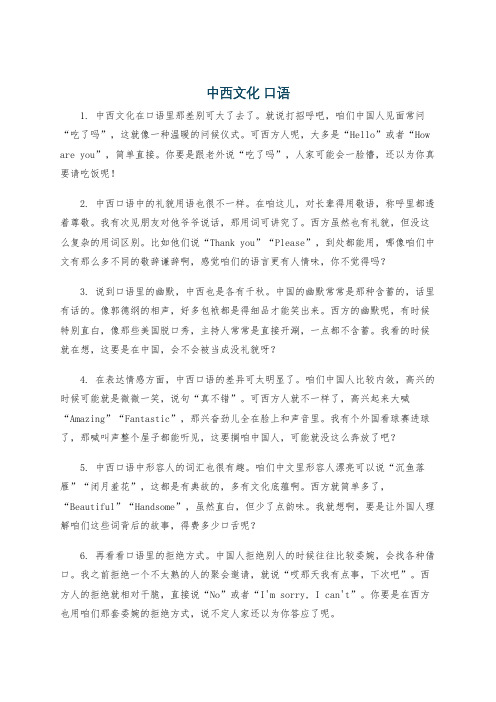
中西文化口语1. 中西文化在口语里那差别可大了去了。
就说打招呼吧,咱们中国人见面常问“吃了吗”,这就像一种温暖的问候仪式。
可西方人呢,大多是“Hello”或者“How are you”,简单直接。
你要是跟老外说“吃了吗”,人家可能会一脸懵,还以为你真要请吃饭呢!2. 中西口语中的礼貌用语也很不一样。
在咱这儿,对长辈得用敬语,称呼里都透着尊敬。
我有次见朋友对他爷爷说话,那用词可讲究了。
西方虽然也有礼貌,但没这么复杂的用词区别。
比如他们说“Thank you”“Please”,到处都能用,哪像咱们中文有那么多不同的敬辞谦辞啊,感觉咱们的语言更有人情味,你不觉得吗?3. 说到口语里的幽默,中西也是各有千秋。
中国的幽默常常是那种含蓄的,话里有话的。
像郭德纲的相声,好多包袱都是得细品才能笑出来。
西方的幽默呢,有时候特别直白,像那些美国脱口秀,主持人常常是直接开涮,一点都不含蓄。
我看的时候就在想,这要是在中国,会不会被当成没礼貌呀?4. 在表达情感方面,中西口语的差异可太明显了。
咱们中国人比较内敛,高兴的时候可能就是微微一笑,说句“真不错”。
可西方人就不一样了,高兴起来大喊“Amazing”“Fantastic”,那兴奋劲儿全在脸上和声音里。
我有个外国看球赛进球了,那喊叫声整个屋子都能听见,这要搁咱中国人,可能就没这么奔放了吧?5. 中西口语中形容人的词汇也很有趣。
咱们中文里形容人漂亮可以说“沉鱼落雁”“闭月羞花”,这都是有典故的,多有文化底蕴啊。
西方就简单多了,“Beautiful”“Handsome”,虽然直白,但少了点韵味。
我就想啊,要是让外国人理解咱们这些词背后的故事,得费多少口舌呢?6. 再看看口语里的拒绝方式。
中国人拒绝别人的时候往往比较委婉,会找各种借口。
我之前拒绝一个不太熟的人的聚会邀请,就说“哎那天我有点事,下次吧”。
西方人的拒绝就相对干脆,直接说“No”或者“I'm sorry, I can't”。
东西方文化差异(英语)

Hi. I’m Lintao. I’m a chinese.
Chinese food is delicious. Come on. Let me show you some that I love
“food is the heaven to the people”
What Chinese people care about is the deliciousness of food
中国烹饪方法奇多:溜、焖、烧、汆、蒸、炸、酥、烩、扒、炖、爆、 炒、砂锅、拔丝等无所不有
• The western people pay more attention to the balance of nutrition, however, Chinese people have too much vegetables.
RIGHT?
Food &Drink
Hello ,everyone. My name is David. I come from American.
Beefsteak, bread, salod.
• In our opinion, one should choose his food only according to his need as an independent individual and the balanced requirement of all kinds of nutrients for each part of his body.
lunch
dinner
Table Manner
• 1.Less sound ,and less movements. • 2.Start with soup. • 3.All the guests get their food ,the hostess will let us begin to eat.
东西方文化差异
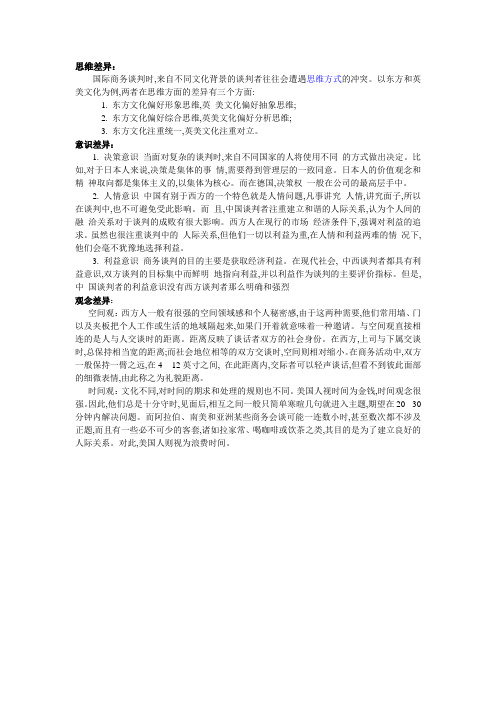
思维差异:国际商务谈判时,来自不同文化背景的谈判者往往会遭遇思维方式的冲突。
以东方和英美文化为例,两者在思维方面的差异有三个方面:1. 东方文化偏好形象思维,英美文化偏好抽象思维;2. 东方文化偏好综合思维,英美文化偏好分析思维;3. 东方文化注重统一,英美文化注重对立。
意识差异:1. 决策意识当面对复杂的谈判时,来自不同国家的人将使用不同的方式做出决定。
比如,对于日本人来说,决策是集体的事情,需要得到管理层的一致同意。
日本人的价值观念和精神取向都是集体主义的,以集体为核心。
而在德国,决策权一般在公司的最高层手中。
2. 人情意识中国有别于西方的一个特色就是人情问题,凡事讲究人情,讲究面子,所以在谈判中,也不可避免受此影响。
而且,中国谈判者注重建立和谐的人际关系,认为个人间的融洽关系对于谈判的成败有很大影响。
西方人在现行的市场经济条件下,强调对利益的追求。
虽然也很注重谈判中的人际关系,但他们一切以利益为重,在人情和利益两难的情况下,他们会毫不犹豫地选择利益。
3. 利益意识商务谈判的目的主要是获取经济利益。
在现代社会, 中西谈判者都具有利益意识,双方谈判的目标集中而鲜明地指向利益,并以利益作为谈判的主要评价指标。
但是,中国谈判者的利益意识没有西方谈判者那么明确和强烈观念差异:空间观:西方人一般有很强的空间领域感和个人秘密感,由于这两种需要,他们常用墙、门以及夹板把个人工作或生活的地域隔起来,如果门开着就意味着一种邀请。
与空间观直接相连的是人与人交谈时的距离。
距离反映了谈话者双方的社会身份。
在西方,上司与下属交谈时,总保持相当宽的距离;而社会地位相等的双方交谈时,空间则相对缩小。
在商务活动中,双方一般保持一臂之远,在4 - 12英寸之间, 在此距离内,交际者可以轻声谈话,但看不到彼此面部的细微表情,由此称之为礼貌距离。
时间观:文化不同,对时间的期求和处理的规则也不同。
美国人视时间为金钱,时间观念很强。
英语学习资料:中西文化差异之请客
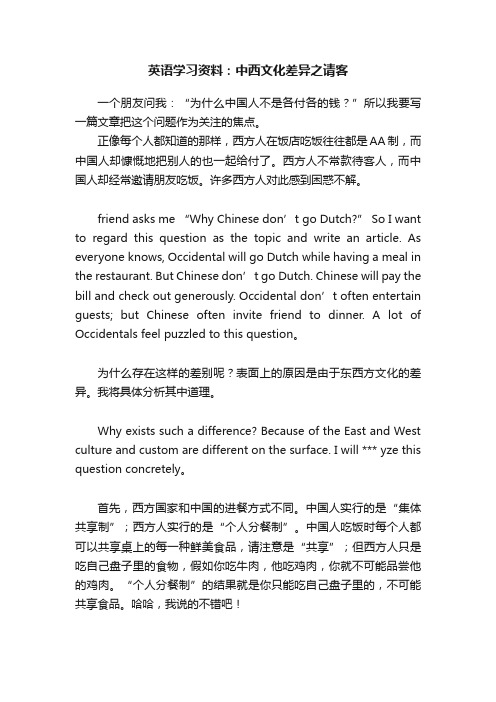
英语学习资料:中西文化差异之请客一个朋友问我:“为什么中国人不是各付各的钱?”所以我要写一篇文章把这个问题作为关注的焦点。
正像每个人都知道的那样,西方人在饭店吃饭往往都是AA制,而中国人却慷慨地把别人的也一起给付了。
西方人不常款待客人,而中国人却经常邀请朋友吃饭。
许多西方人对此感到困惑不解。
friend asks me “Why Chinese don’t go Dutch?” So I want to regard this question as the topic and write an article. As everyone knows, Occidental will go Dutch while having a meal in the restaurant. But Chinese don’t go Dutch. Chinese will pay the bill and check out generously. Occidental do n’t often entertain guests; but Chinese often invite friend to dinner. A lot of Occidentals feel puzzled to this question。
为什么存在这样的差别呢?表面上的原因是由于东西方文化的差异。
我将具体分析其中道理。
Why exists such a difference? Because of the East and West culture and custom are different on the surface. I will *** yze this question concretely。
首先,西方国家和中国的进餐方式不同。
中国人实行的是“集体共享制”;西方人实行的是“个人分餐制”。
中国人吃饭时每个人都可以共享桌上的每一种鲜美食品,请注意是“共享”;但西方人只是吃自己盘子里的食物,假如你吃牛肉,他吃鸡肉,你就不可能品尝他的鸡肉。
中西方发送邀请方式的差异英语小作文
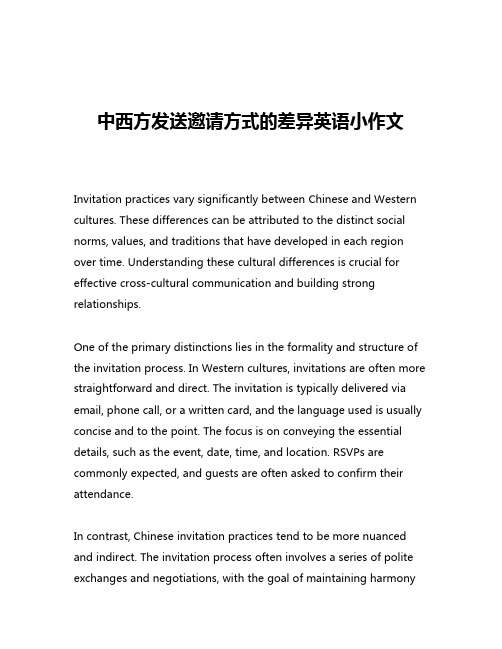
中西方发送邀请方式的差异英语小作文Invitation practices vary significantly between Chinese and Western cultures. These differences can be attributed to the distinct social norms, values, and traditions that have developed in each region over time. Understanding these cultural differences is crucial for effective cross-cultural communication and building strong relationships.One of the primary distinctions lies in the formality and structure of the invitation process. In Western cultures, invitations are often more straightforward and direct. The invitation is typically delivered via email, phone call, or a written card, and the language used is usually concise and to the point. The focus is on conveying the essential details, such as the event, date, time, and location. RSVPs are commonly expected, and guests are often asked to confirm their attendance.In contrast, Chinese invitation practices tend to be more nuanced and indirect. The invitation process often involves a series of polite exchanges and negotiations, with the goal of maintaining harmonyand avoiding potential conflicts. Chinese invitations are typically delivered through personal networks, such as family members, friends, or colleagues. The language used is often more elaborate and formal, with an emphasis on building a sense of rapport and mutual understanding.Another key difference lies in the role of the host and the guest. In Western cultures, the host is responsible for initiating and organizing the event, while the guests are expected to respond accordingly. The host's primary responsibility is to ensure the comfort and enjoyment of the guests. In Chinese culture, however, the host-guest relationship is more reciprocal. The host is expected to extend a sincere and heartfelt invitation, while the guests are expected to demonstrate their appreciation and respect for the host's efforts.The concept of "face" (mianzi) is deeply ingrained in Chinese culture and plays a significant role in invitation practices. Face refers to one's social standing, reputation, and sense of dignity. In the context of invitations, the host is expected to extend the invitation in a way that preserves the face of both the host and the guest. Declining an invitation can be seen as a loss of face for the host, and guests may feel obligated to accept the invitation, even if it is inconvenient, to avoid causing the host to lose face.The timing and frequency of invitations also differ between Chineseand Western cultures. In Western cultures, invitations are often extended closer to the event date, with a clear expectation of a response. In Chinese culture, however, invitations may be extended well in advance, and the host may follow up multiple times to ensure the guest's attendance. This reflects the importance placed on maintaining social connections and a sense of mutual obligation.The gift-giving tradition is another area where Chinese and Western invitation practices diverge. In Chinese culture, it is customary for guests to bring a small gift, such as a bottle of wine or a box of chocolates, when attending an event. The gift is seen as a gesture of appreciation and respect for the host. In Western cultures, while gift-giving is not uncommon, it is not as strongly emphasized as in Chinese tradition.The differences in invitation practices can also extend to the event itself. In Chinese culture, the host may place a greater emphasis on the ceremonial aspects of the event, such as the seating arrangements, the order of speeches, and the serving of food and drinks. These elements are often imbued with symbolic meaning and are carefully orchestrated to maintain social harmony and convey respect.In contrast, Western events tend to be more flexible and informal, with a greater focus on the overall enjoyment and socialization of theguests. The emphasis is often on creating a relaxed and comfortable environment, where guests can freely interact and engage with one another.Despite these cultural differences, it is important to note that the practices within each culture are not monolithic. There can be regional variations, generational differences, and individual preferences that can influence the way invitations are extended and accepted. Additionally, as cultures become increasingly globalized, there is a growing trend of cross-cultural exchange and adaptation, where elements of both Chinese and Western invitation practices may be incorporated into a more hybrid approach.In conclusion, the differences in Chinese and Western invitation practices reflect the underlying cultural values, social norms, and traditions that have developed in each region. Understanding these differences is crucial for effective cross-cultural communication and building strong relationships. By being aware of these cultural nuances and adapting our invitation practices accordingly, we can foster greater mutual understanding and strengthen the connections between individuals and communities across the globe.。
中美饮食文化差异英语邀请函
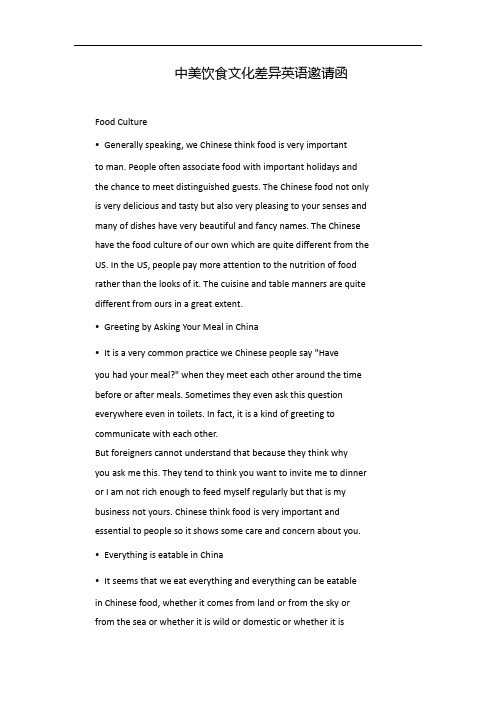
中美饮食文化差异英语邀请函Food Culture•Generally speaking, we Chinese think food is very importantto man. People often associate food with important holidays and the chance to meet distinguished guests. The Chinese food not only is very delicious and tasty but also very pleasing to your senses and many of dishes have very beautiful and fancy names. The Chinese have the food culture of our own which are quite different from the US. In the US, people pay more attention to the nutrition of food rather than the looks of it. The cuisine and table manners are quite different from ours in a great extent.•Greeting by Asking Your Meal in China•It is a very common practice we Chinese people say "Haveyou had your meal?" when they meet each other around the time before or after meals. Sometimes they even ask this question everywhere even in toilets. In fact, it is a kind of greeting to communicate with each other.But foreigners cannot understand that because they think whyyou ask me this. They tend to think you want to invite me to dinner or I am not rich enough to feed myself regularly but that is my business not yours. Chinese think food is very important and essential to people so it shows some care and concern about you.•Everything is eatable in China•It seems that we eat everything and everything can be eatable in Chinese food, whether it comes from land or from the sky or from the sea or whether it is wild or domestic or whether it isinside or outside.•Foreigners cannot imagine we eat the food like snakes, dogsand even frogs. When we sell the meat from the animal and poultry,we normally sell it as a whole or cut it from the whole body. Awoman American teacher didn't want to buy and eat pork when shefirst came to China because she saw the meat cut from a certainpart of the pig.•In English, we know the animals and their meat are useddifferent words because the words of the meat from animalsoriginally come from French and they are used by upper classwhile the words of animals are Anglo Saxon, which are used by thefarmer of lower class. So there are pig and pork, sheep and muttonand cattle and beef in English but it is not the case in Chinese.•Name of Dishes is Implicit in Chinese Food•Very often it puzzles foreigners a lot that we ask and talk somuch when we order our food in the restaurant. One reason is weask what the food or the dish is and try to clarify it because you•(customs on eating food) As we all known that it’ s verydifferent on diet culture between China and America.•They are totally different styles.•China has 5000 years history, we probably spend half of time on food.Chinese people have a lot of ideas and techniques for cooking . Forexample , we can cook a chicken in over ten ways•(American food) Western nation has exquisite and self system food civilization(文明).•Americans don’ t have many skills for cooking, mostly they only boil,steam and bake the food. By the way, they are very good at dessert and chocolate. they can make very good cake and chocolate. They are very sweet but it’ s sort of food which make you become fat quickly.•(Eating habits ) The main difference between Chinese and American eating habits is that unlike.•Where everyone has their own plate of food in China. The dishes are placed on table and everybody shares. If you are being treated by a Ch inese host, be prepared for a ton of food.•(banquet) Chinese are very proud of their culture of foodand will do their best to give you a taste of many different types of course.•Among friends, they will just order enough for the people there. If they are taking somebody out for dinner and the relationship is polite to semi polite, then they will usually order one more dish thanthe number of guests.•If it’ s a business dinner or a very formal occasion, there is likelyto be a huge amount of food that will be impossible to finish.•In America, they would use forks and knives for their meals. Every pe rson has his own dishes and they won’ t share one dish together. They think this is quite hygienic and they will enjoy their meals comfortably. However, what they eat is not so healthy, because they would like toeat a lot of meat and something with high calorie. Maybe it is good for them to obtain more fibers and keep a healthy body.(tabble layout) Bread plates are to the left of the main plate, beverage gla sses are to the right.* Salad fork, knife and soup spoon are further from the main plate than the main course knife, fork and spoon. Dessert utensils are either placed a bove the main plate or served with dessert.General behaviorChew with your mouth closedDon’t talk at an excessively loud volumeRefrain from coughing ,sneezing or blowing nose at the tabble* Never tilt back your chair while at the table, or at any other time.* Do not make unbecoming noises while eating.* Do not play with food or table utensils•* Do not single out or chastise someone who has shown poor table manners.* Do not put your elbows on the table or slouch.* Always ask the host or hostess to be excused before leaving the t able.* Do not stare at anyone while he or she is eating.* Never talk on your phone at the table. If urgent, ask host or hostess to be excused, and go outside. Apologize when returned* Do not single out or chastise someone who has shown poor table manne rs.* Do not put your elbows on the table or slouch.* Always ask the host or hostess to be excused before leaving the table.* Do not stare at anyone while he or she is eating.* Never talk on your phone at the table. If urgent, ask host or hostess to be excused, and go outside. Apologize when returned•* The fork is used to convey any solid food to the mouth.•* The knife blade should be placed on the edge of your plate when not in use. The blade should always face inward.When you have finished eating soup, the spoon should be placed tothe side of the saucer, not left in the bowl.•* Keep your napkin on your lap. At more formal occasions all diners will wait to place their napkins on their laps until the host or hostess places his or her napkin on his or her lap•* When eating barbecue or some other messy foods such as cracked crab, a 'bib' napkin may be provided for and used by adults. Usually these foods are also eaten by hand, and wet wipes or paper na pkins should be used to clean the hands.•* When using paper napkins, never ball them up or allow stains(污点)to show.•* Use your silverware from the outside moving inward toward themain plate. (Salad fork, knife and soup spoon are further from themain plate than the main course knife, fork and spoon. Dessert utensils are either placed above the main plate or served with dessert.) (the end of the meal) * It is acceptable in most places to not finish all of the food on your plate.* When finished with your meal, place your knife and fork with handles at。
